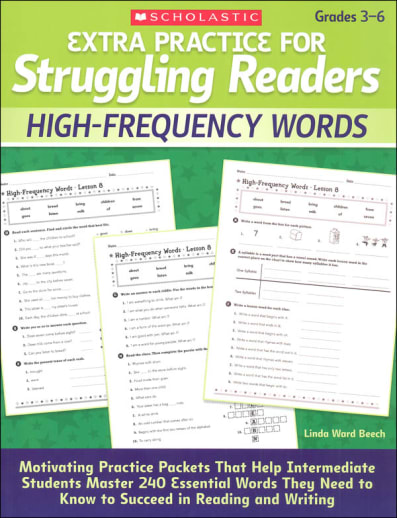Often called "sight words" because readers need to know them at a glance, high-frequency words can prove challenging for students. This resource offers dozens of practice pages that give older struggling readers multiple opportunities to review and really learn common tricky words--such as which, listen, enough, and answer--that aren't easily decodable and don't follow the usual sound-spelling relationships. When students can identify high-frequency words quickly and accurately, their reading fluency increases, and their reading comprehension improves. With repeated practice, students develop automatic recognition of dozens and dozens of words and become more fluent readers.
Extra Practice for Struggling Readers - High-Frequency Words
SKU
075148
ISBN
9780545124102
Grade 3-6
These icons are designed to help you quickly understand and learn important information about our products.
Teaching Method
Traditional
Teacher-centered curriculum commonly used in classrooms that may include a text, teacher manual, tests, etc.
Charlotte Mason
A methodology based on the work of a 19th century educator who maintained that children learn best from literature (Living Books), not textbooks.
Classical
A methodology based on the Latin Trivium (three stages of learning), including the grammar stage (memorization and facts), logic stage (critical thinking), and rhetoric stage (developing/defending ideas).
Unit Study
A thematic or topical approach centered around one topic that integrates multiple subject areas.
Montessori (Discovery)
A methodology based on the work of a 20th century educator that emphasizes student and sensory-driven discovery learning and real-life applications.
Other
Other methodologies
Religious Content
Secular
Contains content contrary to common Christian beliefs (i.e. evolution).
Neutral
Avoids religious or theoretical topics or presents multiple viewpoints without preference.
Christian/Religious
Faith-based or including instructional religious content.
Learning Modality
Auditory
Learns through listening, talking out loud or reading out loud.
Visual
Learns through seeing, prefers written instructions and visual materials.
Kinesthetic/Tactile (Hands-On)
Learns through moving, doing and touching.
Multi-Sensory
Curriculum that employ a variety of activities/components.
Presentation
Sequential
Curriculum progresses through well-defined learning objectives. Emphasizes mastery before moving to the next topic.
Spiral
Topics and concepts are repeated from level to level, adding more depth at each pass and connecting with review.
Conceptual/Topical
Focus is on the “why,” often with a unifying concept as well as specific skills; coverage may be broader.
Teacher Involvement
Low Teacher Involvement
Student-led materials; parent acts as a facilitator.
Medium Teacher Involvement
A mix of teacher-led time and independent student work.
High Teacher Involvement
Teacher-led lessons; may utilize discussions, hands-on activities and working together.
Additional Materials Required
No other materials needed
Everything you need is included.
Other Materials Required
There are additional required resources that are a separate purchase.
Other Materials Optional
There are additional resources mentioned or recommended but are not absolutely necessary.
Consumable
Consumable
Designed to be written in; not reusable.
Non-Consumable
Not designed to be written in; reusable.
Our Price
$12.99 $12.99 $9.50
Rainbow Savings: $3.49
Description
Publisher's Description of Extra Practice for Struggling Readers - High-Frequency Words
Category Description for Extra Practice for Struggling Readers
Featuring over 24 lessons, each of these focused-skill Scholastic workbooks builds and hones specific reading skills. Though the series targets "struggling readers," each will benefit any reader as they develop skills. Each book introduces the specified concept, provides examples, then follows with exercises to practice concepts. Books provide brief teaching tips and answers. Students who need reinforcement with CVC and digraph words will benefit from the Phonics workbook. High-Frequency Words works through 240 essential sight words. Word Families teach prefixes and suffixes, Latin and Greek roots, plurals and more. Nonreproducible, 80 pgs, pb. ~Ruth
Details
| Product Format: | Paperback |
|---|---|
| Grades: | 3-6 |
| Brand: | Scholastic Professional Book Divisn |
| ISBN: | 9780545124102 |
| Length in Inches: | 10.875 |
| Width in Inches: | 8.5 |
| Height in Inches: | 0.1875 |
| Weight in Pounds: | 0.45 |
Videos
Reviews

